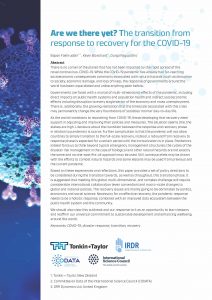As the world transitions to recovering from COVID-19, those developing that recovery need support in adjusting and improving their policies and measures. The situation seems dire, the stakes are high. Literature about the transition between the response and recovery phase in relation to pandemics is scarce. Further complication is that the pandemic will not allow countries to simply transition to the full-scale recovery, instead, a rebound from recovery to response phase is expected for a certain period until the immunization is in place. Pandemics indeed force us to think beyond typical emergency management structures; the cycles of the disaster risk management in the case of biological and other natural hazards are not exactly the same and no one-size-fits-all approach may be used. Still, some parallels may be drawn with the efforts to combat natural hazards and some lessons may be used from previous and the current pandemic.
Based on these experiences and reflections, this paper provides a set of policy directions to be considered during the transition towards, as well as throughout, this transition phase. It is suggested that meeting this global, multi-dimensional, and complex challenge will require considerable international collaboration (even convention) and macro-scale changes to global and national policies. The recovery issues are mainly going to be dominated by politics, economics and social science. Necessary for an effective recovery, the pandemic response needs to be a holistic response, combined with an improved data ecosystem between the public health system and the community.
 was accompanied by a webinar that brought together four of the world’s leading disaster response experts; John Caffin, Bapon Fakhruddin, Sutapa Howlader and Dr William Paton to share the lessons learnt from large scale disasters and how they can be applied to the coronavirus pandemic recovery.
was accompanied by a webinar that brought together four of the world’s leading disaster response experts; John Caffin, Bapon Fakhruddin, Sutapa Howlader and Dr William Paton to share the lessons learnt from large scale disasters and how they can be applied to the coronavirus pandemic recovery.




